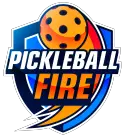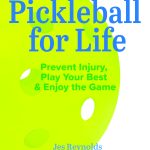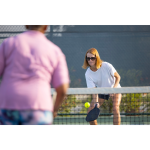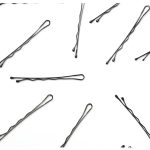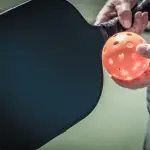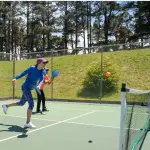Are you suffering from Pickleball elbow? A sore back or knees? Learn how to get rid of your nagging injuries and I talk with Dr. Sanjay Saint and Coach Jes Reynolds authors of Pickleball for Life.
Mentioned in the Show
Show Notes
- Introduction
- Introducing Dr. Sanjay Gupta and Coach Jess
- Discussing their new book, Pickleball for Life
- The Importance of Warm-ups
- Dr. Gupta’s initial experience with pickleball and the lack of warm-ups
- Most players don’t warm up despite its importance
- Coach Jess recommends incorporating mobility, strength training, and core exercises before playing
- The significance of warming up to prevent injury and improve performance
- Mindfulness and Gratitude
- Dr. Gupta shares his thoughts on mindfulness and its connection to heartfulness
- Applying mindfulness in pickleball through gratitude, focusing on the present moment, and enjoying the company of others
- The positive impact of pickleball on mental health and overall well-being
- Fitness, Nutrition, and Performance
- Coach Jess emphasizes the importance of fitness and nutrition for better performance and injury prevention
- The potential to feel better and improve performance with proper guidance and instruction
- Closing Thoughts
- Coach Jess highlights the joy and happiness that pickleball brings to people’s lives

Click Here to Subscribe to the Pickleball Fire Podcast
Transcript
lynn:
Today I would like to welcome to the Pickleball Fire Podcast, Dr. Sanjay Saint and coach Jess Reynolds. How are both of you doing?
jes: Doing great. I’m great. Yeah.
lynn: All right. Well, I do like to start off a little bit with your stories about how you got involved in pickleball and Sanjay. I will go ahead and start with yours in terms of when you got started, first heard about the game and actually started playing.
sanjay:
Yeah, thanks for having us on Lynn. I grew up playing tennis and so I always thought of myself as a tennis player and I had some friends here who actually have now turned out to be our in-laws. Tell me about pickleball. This is probably five years ago, and I thought this was one of these kind.
Midwestern versions of Euchre where that’s is pickleball. I didn’t understand the game. I didn’t understand the name, and I thought to myself, I’m a tennis player too. I mean, I don’t need to play anything else. So I kind of said no. And then finally they invited me. This was now four years ago like New Year’s Day at our rec center, eight in the morning.
To play pickleball. And my son, who’s also a tennis player who’s now married to Eliza Stein, and it’s their, her parents who told me about this, he said, dad, I think you’re gonna really like this game. And so I trusted him. And so I showed up at eight. I, they, I borrowed a wooden paddle and. I played for the next four hours.
I mean, I was so sore. I could hardly even kind of walk to the car and I thought to myself, you know what? I like this game. And then I started playing. So I’ve been playing for four years now.
lynn: And you must have really liked the game if you played for four hours and couldn’t walk afterwards. Actually, that reminds me of senior Pro Dane Gingrich.
He’s a well-known pro and when I interviewed him a while back, he said exactly the same thing. He’s like, I couldn’t walk for like three days.
sanjay: Yeah. And cuz I think what the problem was for me is that I didn’t warm up at. And I, my mind said, this is a simple game. It’s much on a small court. We play doubles rather than singles.
And I was used to playing singles in tennis and that, and you’re playing with people, I gotta see. They were much older than I was, so I thought, this is no problem. So I just went full speed ahead. So I think that was the problem. So I then loaded up with a lot of non-steroidals afterward. But I’m sure we’ll get into that cuz that probably wasn’t the smartest decision.
lynn: All right. And then Jess what’s your story?
jes: Oh, my story about pickleball is actually a lot more vicariously living through Sanjay and his friends who are I’m so fortunate to be training many of them, including the Stein well, Steve Stein, not the Stein, but Steve Stein. Who introduced Sanjay?
I had heard of Pickleball over the years being a kinesiology major and being a trainer for so long I’ve done a variety of sports training various sports. Over the years, and I’ve played myself a few times here and there, but I was really just applying knowledge to help Sanjay.
He was so passionate he started playing and it was like amazing to see the happiness really. And the fun and sort of a shift in motivation for staying fit and healthy, which is, Beautiful to see. Actually. It’s quite gratifying as someone who hopes to instill that passion as a coach, to see someone find that and really grab hold of it and go forward.
But since I’ve been invited to play many times recently. And this whole experience with the book is sort of unfolding and it’s been really kind of fun and a neat experience. I’m going to attend a It’s a mixer for flex league for pickleball next Friday, and I’m gonna enter at the lowest level juice because I wanna like go in with like a blank sheet of paper and just learn from the very beginning level.
I do know about the game and I’ve played, but I have never had instruction and I’ve never played regularly. So me, for me it’s more about, right now, it’s been more about coaching. People to be better and to have less pain and more enjoyment of the game. But then I’m gonna try it out too, in a more serious way, starting next week.
lynn: That is awesome to hear. And I’m curious, Sanjay, how did you first connect
sanjay: with Jess? Yeah, it was about eight years ago, Lynn. So I had just turned 50 and. I had gained a little weight, I would say. And I had, I’m a physician and so I had seen patients like me as when they hit 50, 55, they’d slowly kind of gained 10 pounds a decade.
And then once that happened, then they were having back problems, hip problems, knee problems, and because of the extra weight gain and other stuff, then they. Really run anymore or cycle or get, even get on the elliptical and then their weight went up. So it really became kind of a vicious cycle and I didn’t want that.
I grew s I played sports kind of growing up and I still thought of myself as someone who could play sports. Back then I was playing tennis and asked around for recommendations for trainer. And Jess came really highly recommended. And in fact, one person who told me about her, they had seen her train various people.
And so the thing about Jess is that it’s not a one size fits all approach. She obviously tailors her approaches and methods to the individual and what their needs are, and I kind of really like that because. Again, I would, as a physician, I would, I try to do that to my patients and I kind of liked the fact that there was a trainer who could do that as well.
So sent her an email. We met, we kind of hit it off for the most part. She, when I, she asked me what my goals were and I. I kind of would like a physique, like Christiana Ronaldo she started laughing. The she still is laughing. She still finds that funny. Oh God. I find it funny
too. You don’t even, you haven’t even seen me when I was a little heavier.
It was fun, but I actually kind of wanted, I mean, that just gives you. Insight into my mindset. Cause I really thought I could do that. She’s probably delusional actually, but and so, but she said, well, we can, maybe that can be a stretch goal or something like that. And so then we started working every week for eight years and she helped me change my diet kind of nutrition.
We, I did a whole. Diary of what I was eating and when, and we looked through that and lost weight. And it’s really it’s been terrific.
lynn: And knowing just for eight years and just having that type of relationship, how did kind of go from that to writing a book together and just maybe speak to this fir first of all, what is the title of the book?
A little bit about it and how you guys came to write it.
jes: Well actually Sanjay has the better version of the story. I think we experience it differently. So, Sanjay, why don’t you say your version and I’ll pipe in.
sanjay: Yeah, sounds good. So I so what I would say that initially when I was working with Jess, I really was working on. Lifting weights. I enjoyed doing biceps work.
She kind of refused that. She said, did you do that on your own time? And other types of things. And then once I started playing pickleball, I really experienced some injuries. I have to say, Lynn, I I had shoulder problems. I had some back stuff that acted up. I have an L four L five herniation from when I was a kid.
I had I developed tennis elbow or pickleball, elbow it band problems, planter fasciitis, and I managed those primarily by taking non-steroidals. After I played, sometimes I pre-medicated with non-steroidals. I knew enough about it, so I would kind of ice things. And every time Jess would work with me, she would usually do a check-in.
So how are you feeling? How are things going? And initially I kind of didn’t wanna tell her that I had this because I know that if I told her this, she would say, you need to take it easy, or you need to kind of not play as often or not play for as long. And I wasn’t gonna do that because, I mean, I was kind of addicted to this game, not just.
Playing it, but also my Pickle pals. I mean, that was my kind of social support group especially during Covid. And then I think I probably came clean with her and started mentioning some of these things. And then would we then focused on, we went from weight training to mobility and flexibility and core exercises and.
It would really kind of change things. I became much better at be better on the court. I didn’t have the same nagging injuries or if I did, I knew how to kind of deal with them much better. And so I really appreciated that. And during the, around this time, I had a couple of my friends on the court have Achilles tears.
One was a neighbor of ours that I invited to come out and play pickleball a few years older than I was, but it seemed like he was in good shape. He was at our Mary Lou rec center and I was playing on an adjacent court and I hear a yell and I looked over. It was my buddy who was down, went over and he explained to me what happened.
I looked at it, he is like, oh, I think this is Achilles to rupture. And in fact it was, and he was off it for nine months and. At an outdoor court, same thing happened with someone else who’s an acquaintance. And then I had another person that I saw have a fall on an outstretched hand or a FSH injury that we learned about in medical school who then kind of broke a bone and of course then a lot of people would pull a hamstring or other types of things.
So I saw this and I thought to myself It’s really a bummer for them because now not only can they not play, and I know what that’s like, cause I’ve had my own injuries, but that’s their, that is their social support network. And so when they’re off for six months or nine months, they can kind of, they’re by themselves.
And I can tell you like, if I can’t play, even though love my pickle pals, I’m not gonna call them up and say, Hey, do you wanna meet for coffee or, so I’m just not gonna do that. I know that I’m gonna see them when we play pickleball and we’re gonna have a really good time. And so I wanted to think about how could we spread what Coach Jess was teaching me in a way that’s scalable.
Cuz there’s only one. One, Jess. And because I’ve written books before, medical books, my recollection is that I when I was working with Jess, I said, Hey, Jess, what do you think about an idea for a pickleball book? I think she said it was a good idea. And I said what do you think about taking the lead on it?
I mean, I’ll help you with it, but if you take the lead on it and. And I think she said okay. And then we were kind of, I said we’ll we have an infrastructure here, we can kind of help do things. They’ll be published by the University of Michigan press and all that. And we’ll come up with an outline and have an illustrator and do those things.
And she said, yeah I’m game. And then 18 months later, the book is out. At least that’s my recollection. Jess, do. Is that your recollection?
jes: Kind of, so I do really remember the lead up. Definitely the, all of a sudden you started coming clean about some of your aches and pains. You didn’t do it.
I had to pull it outta you. But once we started having a process for addressing those things, I think you felt more comfortable like, oh if I try to address this, it’s not gonna no pickleball for a month or something. We are gonna have maybe a few days off we’re gonna have something I can do regularly to help myself and we’re gonna evaluate every week to see if it’s getting worse.
We might have to do something different. And then the injuries you witnessed I remember that very clearly and I know that was a big turning point in your mind. For seeing when you saw those things, I know that you felt like you wanted to help and you wanted to figure out a way for people to have help without, maybe they don’t have time or desire to have a trainer, but they would like some coaching.
So I do remember that all very clearly and I thought it was fantastic. The one thing I remember slightly differently than you was the ask. So he remembers asking me to take the lead. I remember him saying, will you help me with this? And in my mind I thought, oh sure, I can write a couple of paragraphs about stretching or whatever.
Because I know that he’s got his system and he’s got his writing buddies and. I’ll just give a little advice. Meanwhile he had other plans, which was great, and it turned out great, but I didn’t necessarily realize what I was getting myself into at the time. But I’m glad I did. It was, it’s been a great experience.
lynn:
Now remind me the name of the book, cuz it, it is now out in print and obviously I’m sure people can get it electronically too.
sanjay: The title of the book is Pickleball for. And you can find it on Amazon. It’s Kindle version is less than $10. The actual book is a little over $20, but we’re hoping for both of those to drop in price. That’s why we went with the University of Michigan press, because we want this to be disseminated as broadly as possible.
And a lot of the people who would buy this are on fixed incomes, and so I understand that. But we also have videos for free that anyone can watch. And those are available on pickleball body.com/videos. But the pickleball body.com has links to buying the book and videos and other types of things. And that’s those videos have Jess and me going through the different exercises that we describe in the book including the stretching and the mobility training flexibility as well, and then warm.
Exercise if you only have a couple of minutes, five minutes, 15 minutes. And then post-game routine is as well. And it’s nice having both of us because you can see Jess doing it perfectly well the way a pro would, and then you see me doing it. Oh. Okay. No, not just, we’re doing a good job, although at all, but doing it kinda o Okay.
And so but hopefully people can find both those things.
lynn: And the great thing is that I did have a chance to go through the book and it’s really interesting cuz you said that the title is Pickleball for Life. And one of the things I loved about the book is that there’s a real mind body connection as you go through it.
And Jess, I think I’m gonna start with you in this case as far as. Sanjay was talking when he first started he couldn’t walk he played for four hours and he thought it was because basically there was no warmup. And I agree. Sanjay said this in the book most pickleball players don’t warm up even though they should be.
So what’s if you were to say like the perfect. Warm up for pickleball what should you be doing and kinda what amount of time.
jes: Well, that’s actually a little bit of a tricky question to answer because of the person that you’re asking. So, if I had my perfect world for every person, I would say the perfect warmup for pickleball is to do mobility three times a week, and then your strength training and then your core.
And then when you get to the court dedicating much of your time to prevention before you arrive. And then when you arrive I usually recommend people to do movements that are similar to what they’re gonna be doing during their sports. So with pickleball, it’s a lot of lateral movement, some overhead, some twisting with your thoracic shoulder circles.
Hip circles. You, I don’t know. I do recommend, and I think some of the guys that Sanjay plays with, they have a ladder. Do you guys do your agility ladder beforehand? I thought Jim told me he was doing that now, and core activation. But you know, if you’re really thinking about warming up, you, I mean, if you’re not motivated to warm up, which I think most adults we’re on limited time.
Warmup isn’t really that fun, right? We’re there because this is our recreational time, our fun time, and maybe we just don’t know exactly what to do. But if you think about youth sports and you think about high school sports and you think about college and professional sports, they’re all warming.
And they’re especially when you get to the higher levels, these are very talented individuals who are warming up. So there is a lot of reasons to do that. But for us recreational athletes, it’s especially important because most of our day we are, most of us are sitting down or we’re hunched forward, or we’re in a relaxed.
Some type of relaxed posture. And when you go to play a sport pickleball your nervous system is not. Firing the proper muscles. It the muscles are not getting the blood flow they need to perform at their best level. So your nerves, your muscles, everything is sort of in a like, I don’t, it’s not relaxed totally, like you’re sleeping, but it’s not you’re not, they’re not like alert and ready, so.
Thinking from that perspective, let’s say you are a person who sits down most of the day, you’re gonna probably be tight in the anterior and lax in the posterior, so you’re gonna stand up and still bring that with you to the pickleball court. So then I would recommend Opening up your chest, stretching your shoulders, stretching your quads and hip flexors, getting your calves firing doing some hip circles, thoracic rotation, shoulder circles, lateral movement, all of those things just to get the muscles and the nerves working together in coordinated movement.
So that when you do go to play it, you’re not just reinforcing your bad postures or just unable to access the proper muscles. When you start to play an actual game, I.
lynn: That’s all great advice and what I really love about what you said is kind of like your work with Sanjay and his pickleball buddies, that really this really should start before you ever even walk on the court.
You know that mobility training, the flexibility training, and then of course you should be at least doing something when you get to the.
jes: I mean, yes. And for me to you’re asking the person whose like job it is to make sure people are like dotting their I and crossing their Ts with fitness and nutrition.
And that’s what I do all the time. So of course I’m gonna over-prescribe like every day, an hour a day. I can’t hold back. I want you to do it. I. Stop that just comes out.
lynn: All right. Well, Sanjay, I’ve with everything that you know and everything you do, you’re busy, you’re a physician. I’m just curious, what would you say your average warmup time is when you get to the court?
sanjay:
Yeah, that’s a good question, Lynn. So the way I do it is I do about 15 minutes. Before I play and like sometimes what I’ll do is if I have very limited time, I’ll get on the elliptical for maybe five minutes and go hard if I’m at home before I go and play, and then I’ll do stretching. And cover your ears, Jess, for about 10 minutes.
And I’ve got a whole routine of kind of the stretching that I’ll do and I’ll especially focus on my lower body because of my problems with the plantar fasciitis and achilles tenderness. And I know I’ve got calf issues as, as well just in terms of tightness there. And I’ll also then when I get to the.
I will do some of the maneuvers that we showed in the video and also in the book in terms of hip circles, and then some dynamic movement as well. I’ll do some squats and, but I’ll also do this, Lynn, when I first start, if I haven’t done a full warmup, I mentally now say to myself, I need to go at 70 to 80% in the first.
I don’t go a hundred percent, 70, 80%. And I also like when I’m now at the kitchen line, when my partner is receiving serve, I will actually do some stretches with my feet. I’ll put my toe on the ground and I’ll do little circles with my heel just to kind of get your ankles going.
sanjay: Yeah.
That’s what it is. Yeah. Get my ankles going. And so I’ve learned ki And the other thing I’ll do is like, let’s say we have a speakeasy pickleball court where we’ll play and there’ll be like six of us play, we’ll play two games and we sit out one. Before I go in, after I’ve sat out, I also will do a little bit of stretching then too, because AF sitting down for 10 or 15 minutes, I get a little bit tight and so I’ll get up and I’ll do some stretching there.
Also, kind of similar to what Jess will say, but I would say I do that for like two minutes before I go in rather than the ideal 10 to 15 minutes.
lynn: And I like the idea of even being able to take some time on the court to stretch, especially in that first game because if you think about it, sometimes you know the ball goes way down to the other end of the courts and yeah, you do actually have a little bit of time to get something small in that’s, All right.
Well let me pivot. Cause like I said the book is great because it does really combine that mind body aspect. And I’ve talked on the podcast here recently about mindfulness, but I think it’s such an important. Aspect of really something we should be doing in life. And it does transfer over and help on the pickleball court.
And in the book, Sanjay you had a great story about mindfulness, so why don’t you share that?
sanjay: I appreciate that, Lynn. And yeah, this is actually kind of similar to what Dr. Michelle talked about on your March 6th podcast on staying in the moment and staying fully present. So mindfulness it’s an interesting concept.
I mean, it was proposed by the Buddha 2,500 years ago where all things begin with the. And it’s all part of Hindu and Buddhist tradition about mindful breathing and paying attention to the breath going in and the breath going out. It was brought to the western world, at least in this country by John Kazin, probably about four decades ago when he used mindfulness to help with stress reduction and to control BL high blood pressure and those types of things.
And also the Buddhist monk. The late great tick Knott Han also has written extensively about mindful practice, and he’s the one who said that mindfulness should be an everyday thing. And the way I think about mindfulness is that it’s the attention that arises by the awareness that arises by paying attention on purpose in the present moment without judgment.
You’re aware of the present moment what thoughts are coming in, what thoughts are going out, but you’re not judging those thoughts. The way I think about it for pickle Ball is that I think there’s a close link between mindfulness and for me it’s heartfulness. Because when I get on the court, especially if it’s a nice day or I meet with my pickle pals, I’m off work.
I the first, my first kind of hack that I do and I love what Jen Jacob said. Dr. Jen March 13th said when she laces up her shoes, she forgets about all the emails and all the other stuff, and now she’s fully aware. It’s very similar to me. It wasn’t lacing up shoes, but now that I’ve heard that, I think that’s what I’ll do.
But for me it’s just such gratitude that I have a body that functions and works. I’m able to move. I still have the mental capacity where I can keep track of the score. 3, 1, 2, 3. I mean all of that kind of stuff. And that I’m with people that I really enjoy spending time with. And so there’s a gratitude and even when I’m not playing as well as I would like to play, I think to.
That who has it better than us? We get to play a sport, we get to play it hopefully until we’re a hundred years old. We get to play it for life and we get to play it with people from all walks of life. And the lovely thing about pickleball is it doesn’t matter who you are, what do you do?
No one even pays any attention to your profession or the car you drive, or the house you live in. You’re just Sanjay and you’re a pickleball player, and you’re Lynn and you’re a pickleball player, and do you wanna play? And for me, that actually just makes me quite joyful, I have to say.
lynn: All right. Well, I know that Coach Jess has got a client coming in soon. Any final thoughts Jess or Sanjay?
jes: My final thought is I would like to say that every single person I have worked with who plays pickleball or talked to who just started pickleball, has so much happiness. From the sport, and I think it is a real source of joy for many people.
And I think that when, and if someone were to decide that they want to either play it for longer, play it better, or start playing adding fitness and nutrition, especially mobility into their regular regimen. Could benefit them in so many more ways than they might be currently aware of. And I think it is worth taking a look at the book and the videos and trying some of these things for yourself to see where it could get you.
I’ve had so many people be amazed. At how much better they feel just from, they just it’s, these are bright, brilliant people that just were not aware of the steps to take, in order to feel better and to prevent injury and to play better and then have more fun with each other and in this sport and to progress in their performance.
So I just, I really like, especially in these last few years, I have really gotten. More passionate about letting people know don’t just assume because you’re ex X Age that you know you’re gonna be in pain. You’re gonna be achy all the time. I’m not saying you’ll never. Have pain or you won’t have any aches, but it is a lot different when you just have a little bit of instruction, a little bit of structure, someone to help you, someone knowledgeable, just to guide you.
You would be really surprised at how great you can feel. And I want everyone to know that. And I’ve been amazed at some of the things I’ve been able to accomplish with people I train. And I hope that this book is a way for more people, even though maybe I don’t work with them in person, to really get that that they don’t have to feel quite so achy and be quite so nervous about maybe pursuing this sport or any other sport really.
But in this case, especially pickleball.
lynn: All right, well that is great advice. Sanjay, any final thoughts?
sanjay: Well, first, thanks so much for having us on, Lynn. I really appreciate it and I appreciate what you do. Yes. For the sport. And I guess what I would say is I have sent quite a few people to Jess because I think for a lot of us, myself included, I don’t know if it’s ego or something, We don’t think we need to be coached when it comes to exercise or fitness or what we eat, and part of it is this, well, you’re not the boss of me.
I know what’s best for me. And I wish I would personally would’ve gotten over that even before eight years ago. Cuz I think I would’ve avoided some of the problems that I had because I’ve never felt so good. I mean, I’m no Christiano Ronaldo. I probably never will be, but I’ve never felt so good, especially because I’ve been working on things like mobility and flexibility and nutrition, and I have just a thank for that.
lynn: All right. Pickleball Fire Podcast audience. It’s pickleball for life. And you guys, Sanjay and Jess we’re an absolute delight to have on the podcast. I’ve gone through the book. I highly recommend it, and I will sign off and thank you again for being on.
jes: Thank you so much.
sanjay: Thanks Lynn. See you on the courts.
